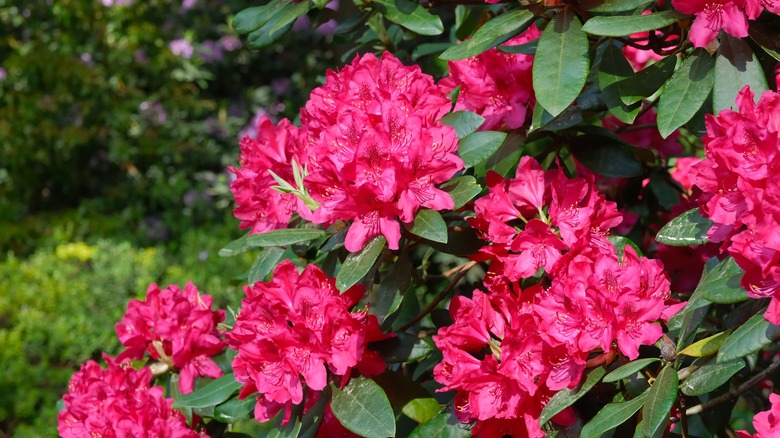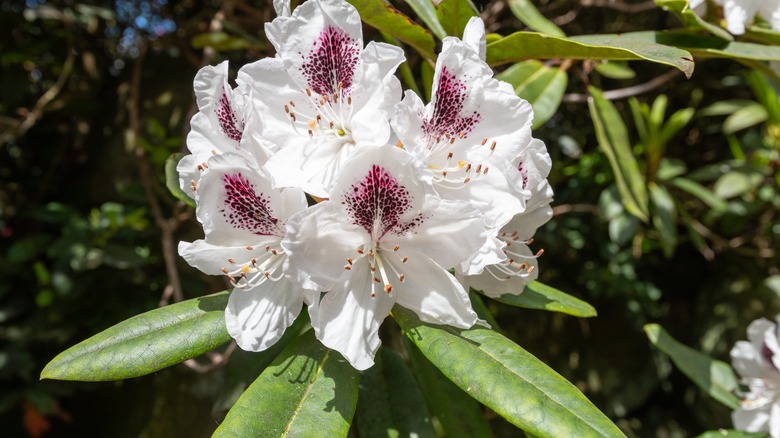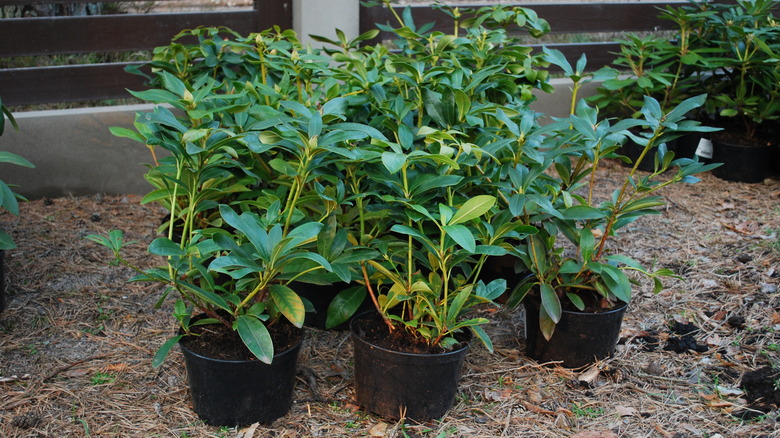The Best Way To Propagate Rhododendron For More Gorgeous Blooms
Rhododendrons (a plant family that includes azaleas) are stunning garden plants that produce gorgeous bloom clusters. In fact, rhododendrons are one of the best shrubs to grow in your yard for a colorful spring. There are numerous species and cultivars available, many of them being native to Asia and the U.S. The Pacific rhododendron, Washington's state flower, is a flowering shrub sure to attract hummingbirds to your garden. Most species will grow to a maximum height of around 10 feet and a spread of up to 8 feet. They can be grown in USDA hardiness zones 4 through 8. The best way to propagate rhododendrons is to use cuttings that can be taken from summer right through to early winter.
While propagating rhododendrons from cuttings is an ideal method to get more of these plants and their beautiful blossoms, you can also try using a layering method or by growing them from seed. However, only true species should be grown from seed, as seeds taken from hybrids or cultivars will not produce plants similar to the parent plant. So, if you have a beautiful specimen growing in your garden and you want to reproduce it but don't know its origin, it's much safer to propagate it using cuttings. This way, you'll get new plants that are identical to the original plant. Here's how to easily propagate rhododendrons from cuttings.
Prepare your cuttings
As already mentioned, cuttings should be taken from September through to December. However, cuttings from dwarf rhododendrons can be taken from July through to September. Choose nice healthy side branches that have around three to five new shoots growing from a main stem. These should root fairly easily. Ideally, you want to take your cuttings in the morning because the stems will still contain adequate moisture. Each cutting should be around 2 to 3 inches long. Remove the lower leaves and cut the large leaves at the top in half as this will limit transpiration. If you're propagating a rhododendron that only has small leaves, these don't need to be cut in half.
Fill a seedling tray or some small pots with either seed-starting mix or make your own mix by combining equal parts of coco coir and perlite or vermiculite. Wound the base of each cutting by removing a small sliver of green bark, around half to 1 inch long, on either side of the stem. For the best results, dip the base of cutting into a rooting hormone such as RootBoost that contains indolebutyric acid. Make a hole in the growing mix with a pencil or dibber and insert the stem of the cutting into the moist mix. Firm the mix around the base of the cutting so that it sits upright.
Caring for your cuttings
Once you've inserted your cuttings into the propagation mix, create a humid environment for the best chance of success. You can either purchase a plant cloche from your local garden center or make your own. One of the easiest ways to do this is to get an empty soft drink bottle and cut it in half. Now you have two plant cloches that you can place over the pots to create mini greenhouses. For seedling trays, you can simply use a clear plastic bag and fashion a frame from wire or an old coat hanger to support this and keep it from touching the cuttings.
Place your cuttings in a warm, bright spot that doesn't get any direct sunlight. If you apply bottom heat to the cuttings, they will root a little faster. You can do this by purchasing a heat mat from your local garden center or putting your cuttings on top of your hot water heater if that is feasible. Make sure that the soil remains moist but not wet. The plant cloche should help to keep the moisture in but you might need to replenish it by spraying the soil with water if it starts to look dry. It can take between two to six months for your cuttings to produce a good root system. Once your plants are ready to be hardened off and planted, you'll want to know the best way to care for your new rhododendron bushes.


